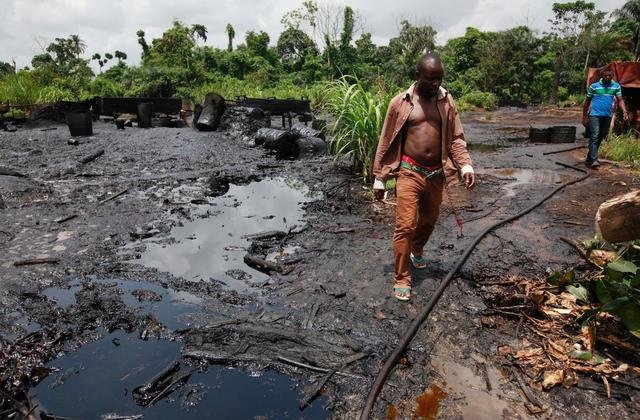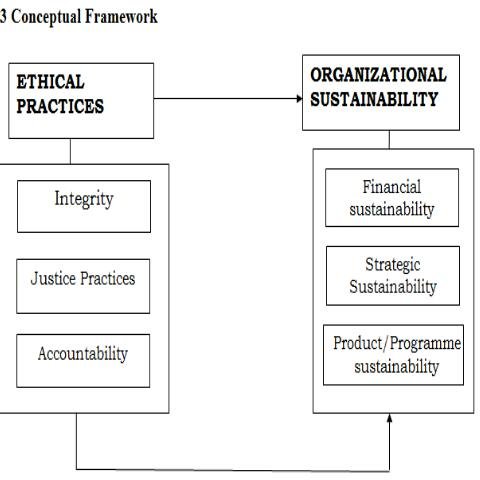Ethical practices and organisational practices in Nigeria
This study is organized into two (2) distinct chapters with subdivisions as follows:
The first part: It consists of the background to the study, statement of the problem, conceptual framework.
Chapter Two: This dealt with the review of related literature on the subject matter.
Background of the Study.
Over the years, defining, measuring organizational sustainability have never been an easy task. Organizational sustainability comprises of a business model that creates value consistent with the long term preservation and enhancement of financial, environmental and social capital. Researchers have come out with different opinions and definitions.

For example, Colbert and Kurucz (2007) defined organizational sustainability as being able to “keep the business going”.
For Boudreau and Ramstad (2005), organizational sustainability involves “achieving success today without compromising the needs of the future.
According to Eccles et al., (2011), the essence of sustainability in an organizational context is “the principle of enhancing the societal, environmental and economic systems within which a business operates”. This introduces the concept of a three-way focus for organizations striving for sustainability. This is reflected also by Colbert and Kurucz (2007), who stated that sustainability “implies a simultaneous focus on economic, social, and environmental performance”. Figuratively speaking, there is one common component connecting all the views on organizational sustainability. They include
- maintenance
- sustenance or continuity of a certain resource, system, condition or relationship, in all cases
The goal is keeping something at a certain level, of avoiding decline.
Regardless of the varying views on organizational sustainability, contemporary firms are increasingly engaging in it as part of their business model due to the perceived importance to both the organization, and the society at large. At the same time organizational sustainability makes a company more attractive and therefore attracts a larger number of higher qualified applicants. This increases the average skill level of employees that transcends into a higher work effectiveness, improved communication, enhanced green production processes and improved relations with suppliers that ultimately results in an increase in operational effectiveness. labour disputes, accidents, supervision, advertisement, production and tax payments). At the same time, value is created in terms of innovation by releasing the innovative potential of employees through learning and commitment, and implementing up to date environmental practices, as well as incorporating societal challenges. Thanks to a higher level of operational effectiveness, organizational commitment of employees and learning, the productivity of a company can be increased, errors reduced and quality improved, while adherence to environmental standards enhances product safety.
Statement of the Problem
Using ogoni as the case study, about 1000km of its land mass has been abandoned and polluted because of the activities of the company in the exploration of oil. That was in 2011. According to United Nations Environment Programme (UNEP), it would cost over $1billion and take up to 30years to clean up. The “crime scene” of environmental despoliation is intensifying throughout the Niger Delta, and less than one percent of environmental justice cases make it to the Nigerian courts.

One of the major dilemma facing most corporate institutions is the obvious need to be seen as socially responsible enough to sustain their environment. This is because being socially responsible creates a good public image that further increases customer patronage. However, very few businesses are willing to take this step to sustain their environment, primarily because it is associated with a short term cost to the organization. For example, in Rivers state, the oil exploration, especially the spills and other environmental threats associated with oil production in the state have tremendously caused disruption of the ecosystem stability and traditional livelihood structures of the host communities (Zabbey, 2005).
Despite their awareness of this situation, most oil companies either pay lip service or make very negligible efforts to correct this problem and sustain the environment. They have these bizarre feeling that it will take a large portion of ther profit.
However, they fail to realize that they cannot exist in the air, but need a host community to function.

Literature Review.
There are two major views outlines in this work and they are
- Classical view: this is popularly called shareholder theory. Here firms are supposed to provide profit for shareholders at whatever cost it takes. It is believed that the main concern of business management is the shareholders and the sole concern of shareholders is profit maximization. The classical view indentifies two perspective which are “pure profit-making view”; and the “constrained profit-making view”. For pure profit, unethical practices is at its peak and is generally acceptable as long as the profits are coming but constrained profit making, as the name implies, unethical practices isn’t accepted. Standards must be followed and organization must be honest. The only responsibility of business is to use its resources to engage in activities designed to increase its profits so long as it stays within the rules of the game.
- The Stakeholder theory is the opposite of shareholders theory and represents a fundamental challenge to strict shareholder theory. Stakeholder theory embodies the need to balance the claims of shareholders with these of other stakeholders.
Ethical Practices
Many people believe that talking about ethics, values, integrity, fairness is not only acceptable in the business community but it is actually necessary.
Ethics is the concept of morals; one’s ability to choose between right and wrong, good and bad, acceptable and unacceptable (Desjardins, 2009).
In business organizations, managers debate on this issue because there is no single satisfactory standard of ethical action agreeable to everyone that a manager can use to make specific operational decisions. However, there are people who see business ethics as important as the profit the organization derives.
Gano (2009) suggests that ethical decisions are made by business people, based on the following considerations:
(1) how employees can feel fulfilled professionally;
(2) how customers can be satisfied;
(3) how profit can be assured for the stakeholders or shareholders; and
(4) how the community can be served.
The dimensions of ethics are;
- Integrity: The current study takes a small step toward providing empirical evidence by examining the impact integrity has on people’s perceptions of sustainability in a sample of public sector managers.
- justice practices: Organizational justice refers to an individual’s perceptions of and reactions to fairness in an organization. Prior research has conceptualized organizational justice along three primary dimensions: distributive, procedural, and interactional. Distributive justice refers to the equity of distribution of resources and decision outcomes, while procedural justice concerns the perceived fairness of processes that lead to outcomes (Curran, 2005). The third dimension, interactional justice, deals with the perceived fairness of treatment received by an individual.
- Accountability: accountability can be achieved best by the use of contracts. This relies on the ability to reduce all accountability relationships to ones of obligation, where there is a principal/agent relationship. So long as the contract is clear then the obligations under the relationship are clear as are the information needs to monitor the performance of the contract.
Organizational Sustainability
organizational sustainability is the integration of social, environmental, and economic concerns into an organization’s culture, decision-making, strategy, and operations. The primary drivers behind this adoption process external to the organization, such as environmental regulation and standards set by governments, or pressures resulting from customers’ groups and the community.It has been stated that internal organizational pressures for the adoption of sustainability practices, such as staff turnover due to decreasing firm loyalty and workplace satisfaction. The measures of organizational sustainability are financial sustainability, strategic sustainability and product sustainability.
Use case scenario
Assumimg the managers in oil companies in Rivers State are 220 from some selected oil companies nigeria
| S/NO | Oil Companies | Total no of Managers | ! | |
|---|---|---|---|---|
| 1 | agip | 58 | ||
| 2 | shell | 57 | ||
| 3 | nnpc | 55 | ||
| 4 | nlng | 50 | ||
| 5 | total | 220 |

The stratified sampling procedure was used in selecting the sample elements for the study. Stratified sampling procedure as an applied random sampling method in which the population is grouped into some definite characteristics. These groups are called strata. From these strata, the sample is chosen by applying random selection technique on each stratum. However, in choosing a particular number of items from the various strata, the researcher must ensure that the number is proportional to the stratum’s share of the total population. In this study, the researcher divided the accessible population into 4 different strata on the basis of the 4 different selected oil companies in Rivers state.
CONCLUSION
The conclusion of this study is varied, impacting on several stakeholders of oil companies. First of all, findings from this study will be useful to members of host communities as it will help to encourage oil companies to operate in their community in a sustainable manner.
Secondly, it will help to increase customer patronage for the oil companies due to the good public image that accompanies organizations that are socially responsible to their environment. Also, in the long run, increase in customer patronage will result in higher profits to the shareholders of the oil companies. This study will also benefit the government because by operating sustainably, organizations help to conserve government revenue that would have been used to redeem the environment.
Dear friend, you do not appear to be following @wafrica. Follow @wafrica to get a valuable upvote on your quality post!
Hi @wafrica
I have followed you..... I am hoping to leverage off your generosity
Congratulations @kariboro! You have completed the following achievement on Steemit and have been rewarded with new badge(s) :
Click on the badge to view your Board of Honor.
If you no longer want to receive notifications, reply to this comment with the word
STOPCongratulations! This post has been upvoted from the communal account, @minnowsupport, by kariboro from the Minnow Support Project. It's a witness project run by aggroed, ausbitbank, teamsteem, someguy123, neoxian, followbtcnews, and netuoso. The goal is to help Steemit grow by supporting Minnows. Please find us at the Peace, Abundance, and Liberty Network (PALnet) Discord Channel. It's a completely public and open space to all members of the Steemit community who voluntarily choose to be there.
If you would like to delegate to the Minnow Support Project you can do so by clicking on the following links: 50SP, 100SP, 250SP, 500SP, 1000SP, 5000SP.
Be sure to leave at least 50SP undelegated on your account.
Congratulations @kariboro! You received a personal award!
You can view your badges on your Steem Board and compare to others on the Steem Ranking
Do not miss the last post from @steemitboard:
Vote for @Steemitboard as a witness to get one more award and increased upvotes!